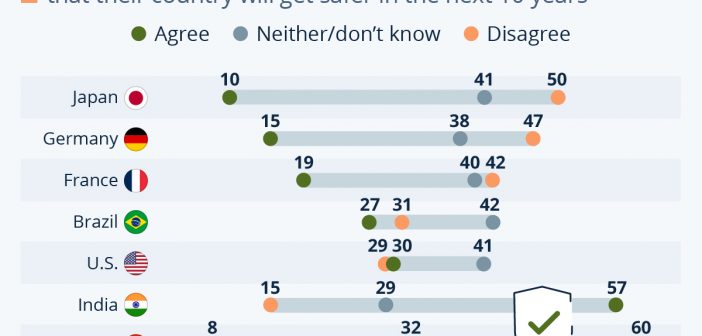Munich, Germany – As world leaders and security experts gather for the annual Munich Security Conference, a recent survey reveals a stark divide in how citizens of major economies view their national security outlook. While residents of China and India express optimism, those in Western nations like Japan, Germany, and France harbor significant pessimism, according to a report on German statistics portal, Statista
Skepticism Prevails in the West:
The survey, conducted ahead of the conference, paints a worrying picture for Western nations. In Japan, Germany, and France, over 40% of respondents believe their countries will not become safer in the next decade. The United States and Brazil are more divided, with opinions split roughly down the middle. This pessimism stands in stark contrast to China and India, where the majority expressed confidence in their national security’s future.
Shifting Threat Perceptions:
The 2024 Munich Security Report, also released today, offers some nuance to this narrative. While acknowledging a “moderation” in concerns compared to the immediate aftermath of the Russian invasion, the report highlights that perceived threats remain elevated compared to pre-2022 levels. Interestingly, the perceived threat of Russia has shifted within the G7, peaking in 2022 before dropping to fourth in 2023. Nuclear aggression concerns follow a similar trend.
This suggests that while initial anxieties have subsided, long-term concerns about Russia’s actions persist. However, the report notes a different dynamic in the BICS countries (Brazil, India, China, and South Africa) where “risk perceptions have been less volatile,” implying less of a turning point perception regarding the war’s impact.
East vs. West Divergence:
The report delves further into this East-West divergence, noting that perceptions of Iran and Russia have remained largely static in the BICS group, while views of China have even improved. This contrasts sharply with the G7, where concerns about these actors remain prominent. This difference potentially reflects the varying geopolitical alignments and strategic interests of these regions.
Uncertain Security Landscape:
The mixed sentiments highlighted in the survey and report paint a complex picture of the global security landscape. While some nations exhibit growing optimism, others remain gripped by anxieties. This underscores the need for nuanced analysis and multilateral cooperation to address a range of evolving threats.
Looking Ahead:
The upcoming Munich Security Conference promises to be a crucial platform for dialogue and collaboration. Leaders from across the globe will have the opportunity to discuss these contrasting perspectives and work towards solutions that foster greater security and stability for all nations.






